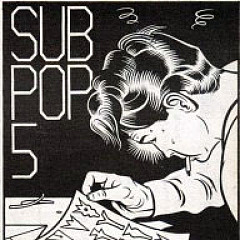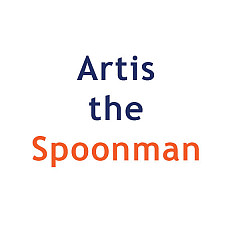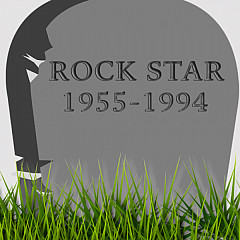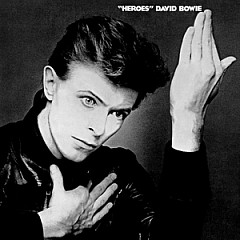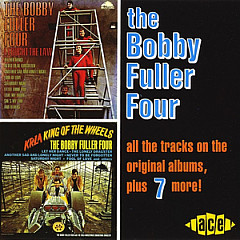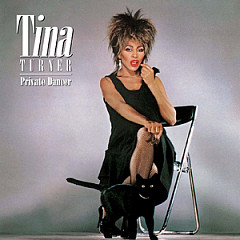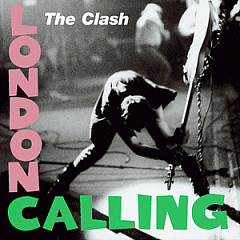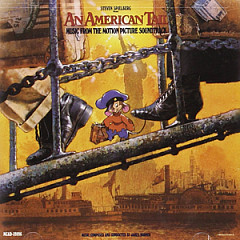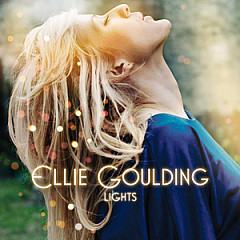 Fastball's first album, released on the Disney-owned Hollywood Records in 1996, got great reviews but sold about 14 copies. Their next one sold over a million.
Fastball's first album, released on the Disney-owned Hollywood Records in 1996, got great reviews but sold about 14 copies. Their next one sold over a million.It was only through a quirk of timing that Fastball got to make a second album on Hollywood: the label head had been fired, so there was nobody to drop them. That second album, All The Pain Money Can Buy, sat on the shelf until a rep from the label took copies of "The Way" to radio stations, which saw their phone banks light up when they played it. By the summer of 1998 it was saturating the airwaves as the album was headed for Platinum.
The band split songwriting and vocals between multi-instrumentalist Tony Scalzo and guitarist Miles Zuniga. Scalzo wrote/sang "The Way" and "Out of My Head"; Zuniga did "Fire Escape."
"The Way" is about Lela and Raymond Howard, an older couple from Salado, Texas who drove to a nearby festival and disappeared. The story was big news in Fastball's hometown of Austin, and while the search was on, Scalzo wrote the song. He imagined the Howards setting out for adventure, asking the very zen question, "Where were they going without ever knowing the way?" The story didn't end well: Lela and Raymond were found dead 13 days and 400 miles from where they started. Fastball's song, though, proved malleable in meaning. Friends and family of the Howards have embraced it as a testament to their spirit. Many others have used the song to frame their own adventure or help cope with the loss of a loved one (check out the comments in the Songfacts entry).
Through no fault of their own, Fastball fell out of favor after All The Pain Money Can Buy. Hollywood dropped them after one more album, but they have kept at it, releasing three more albums independently with the same core lineup of Scalzo, Zuniga and drummer Joey Shuffield. Popular culture has shackled them to the '90s, but there is lots of great listening in their more recent output.
On November 9, All The Pain Money Can Buy gets a 20th anniversary re-release, with seven bonus tracks, including the original demo of "The Way" and an acoustic ("unpaved") version of the song. Scalzo took us through some of the memorable moments in the band's history, including the videos they made with McG and Francis Lawrence, but we'll start with our burning question about "The Way."
 Carl Wiser (Songfacts): Tony, how did you create the radio scanning on "The Way"?
Carl Wiser (Songfacts): Tony, how did you create the radio scanning on "The Way"?Tony Scalzo: With a radio. We just put a mic in front of the radio and turned the dial.
Songfacts: So that's really like a snapshot of 1997 radio.
Scalzo: Yeah, summer '97 Los Angeles radio.
Songfacts: Did you run into any rights issues?
Scalzo: Um, no.
Songfacts: I figured it was fair use if you used just a fraction of a second of a song from a radio broadcast, but wasn't sure if somebody would make an issue of it.
Scalzo: There is nothing really they can do about that. And I wouldn't even have known who was being sampled unless you told me. We didn't even know.
Songfacts: What was it like writing that song as the whole Lela and Raymond Howard story was unfolding?
Scalzo: Well, I didn't think it would be anything but an abstraction of their story, so I wasn't really thinking about that. Also, I wasn't expecting it to be this massive song that everybody liked, so I was unfettered by any of those concepts.
Songfacts: Where do the inspirations for your songs typically come from?
Scalzo: I get my inspiration from wherever I can. Music is the main driver for me creatively, and when I say "music" I mean a melody, a rhythm, not necessarily words and music all at once. Do you write songs?
Songfacts: No, unfortunately I don't have that talent.
Scalzo: It's hard to explain to a non-songwriter. It's always been that way.
Songfacts: Let's take a specific song that I've always been interested in from your first album: "Are You Ready For The Fallout?" Can you talk about how you put that together and where the lyric came from?
Scalzo: Growing up, I had a lot of problems... I was kind of a fuck-up. Wanted to be a rock-n-roller, didn't know what that really meant. And I remember my little brother telling me like 30 years ago, "I wish I could look up to you. I wish that you could be the role model that I would expect from an older brother."
That's where the incentive or the subject matter of that song is coming from, and I turned it around - it's me giving advice.
Songfacts: I know it's very hard to explain, but you seem to have a way of putting words and music together that really connects, and one of the songs that does that is "Out Of My Head," Especially when you hit that first line, "Sometimes I feel like I'm drunk behind the wheel... the wheel of possibility." Can you talk about that song?
Scalzo: That line comes from the idea of being powerless, not in control over what happens to your life.
Scalzo: Sure. There's hardly any lyrics to that song - I don't know if it has any real meaning to me at this point in my life.
Songfacts: Well, it must have meant something to you at the time. What was going on that led you to write that?
Scalzo: I was a struggling musician. I had a record deal, so I knew there was a chance that things were going to turn around for us and for me, but I was struggling, and I was really ambitious at that time. Maybe I was just thinking about recurrent situations and how hopefully things would come out right.
I guess it sounds like a relationship song. I was in an OK relationship at the time, so it's really abstract. It's not like I'm writing down my heart and I'm trying to express my feelings through these songs - it's nothing like that. It's just stuff in the back of my mind and trying to come up with some good words. I don't even know if they're that good. I don't even know if I understand what I'm saying when I say it.
Songfacts: Do you really believe they're not that good?
Scalzo: I just don't know. I'm not a critic. I mean, people like it. I wouldn't even write those lyrics today. It wouldn't come out like that. I'm older... I'm a lot older.
Songfacts: What you wrote is certainly very good, and people have taken incredible meaning from that and many of your other songs.
Scalzo: Yeah, thank you, I know that's true too. It's pretty awesome. I like that people like that. For my Pledge campaign, one of the rewards is a signed lyric sheet. I have to sit with those lyrics and write them out and I look at them and I'm like, "That's funny that I wrote that." It's a weird perspective.
And that song has become something completely different for another artist. I can't relate to that very well, but that's OK.
Scalzo: Correct, yeah.
Songfacts: That's not what they teach you in songwriting school.
Scalzo: Do they have those? Because I'd like to go.
Songfacts: I'm sure they have them in Austin.
Scalzo: They might yeah. I should teach one maybe.
Songfacts: You probably should. But was there ever anybody who said, "No, Tony, you can't do this, you need to have another verse here and maybe a bridge"?
Scalzo: Sure, his name is Miles Zuniga. He helps me a lot actually, especially lately because I'm more open to his opinion.
We do a lot more collaborations today than we did back then. Back then, we were so ambitious together and separately that we were in a competition almost, and that's why it might seem like my songs had a different vibe than his. Now we have songs that we have co-written. We'll go to the studio to record a song, and he'll say, "That really needs one more verse," and I'll look at it and go, "You're right, it really does."
Usually it's not too hard to come up with something if there's that concrete help or advice or perspective. But there's convention. If you go through the catalogue of Bob Dylan, you'll watch convention being thrown out the window hundreds of times.
Songfacts: Was the way "Out Of My Head" came out a result of that tension with Miles?
Scalzo: No. That's an example of working with a producer. I would say that had more to do with [producer] Julian Raymond reshaping it a little bit. It's not too different from the demo when you put it in musical terms. It's the same key, basically the same tempo, it's just a little bit more lively.
I was going for a really "wee hours" Elvis Costello kind of sound, like mid-period Elvis Costello. He would do this stuff where his voice was very close to the microphone and it would be really low, and consequently I wasn't able to reproduce that song live in the same key that it's recorded in - we actually do it in G, and it was recorded in E - because I can't project loud enough to play it on stage in E. So, it's very different when we play it live, and it always has been.
But yeah, you were saying how it got affected by being recorded formally and it's because the producer comes in and he's going to take those demos and he's gonna put his mark on it. I liked the way it came out for sure - it came out very well.
Songfacts: You had the opportunity to work with at least two film directors who ended up becoming famous.
Scalzo: Correct.
Songfacts: Can you talk about working on the "The Way" video with McG?
At that time, 1989, 1990, there were all these bands around and I was part of that Orange County scene. We tried to make it up in Los Angeles and San Diego and tried to get original things happening. One of my best friends is A.J. Nesselrod, who has become a great painter and art educator. He was in a band with me and all these guys who went to school together. I was a little older and didn't go to school where they went, but I noticed this sort of clique of guys, and McG was part of that. He and the guys from Sugar Ray all went to Corona Del Mar High and I didn't know anything about his being an up-and-coming filmmaker/music video director, but I noticed really fast once we got on a major label and I started seeing videos by Smash Mouth and Korn and all these other bands. He was cutting edge. That stuff looks so dated today, have you noticed?
Songfacts: It does. That '90s layered look.
Scalzo: The colors and all the techniques they were using - you see the lights in people's eyes when they're singing and all that color. Fill in every kind of color you can.
So that was great working with him but I only worked with him because he knew me and I thought he was good at directing a video. We'd gone through other treatments with other directors, and McG popped up. Then McG called somebody at Hollywood Records and said, "I know Tony, he's a bro, and I want to do it."
I don't think he did many music videos after that. He started doing all this TV and then boom, he's directing things like Charlie's Angels and The Fast And The Furious.
 Fastball, 1998
Fastball, 1998Scalzo: It was gnarly. I look back and I'm not too much of a fashion criminal, but there's a couple of things I regret. I used to wear these old, beat-up painter pants, kind of baggy. I had a wallet chain, you know.
But for the most part, I think I was OK, I'm not too dated looking. I started wearing western shirts and kind of bland stuff, and a leather jacket. I grew my hair long - I wanted to look more like a crew guy or just some old rock-n-roller. I didn't go in on the dyed facial hair, the 'N Sync-meets-Limp Bizkit look.
Songfacts: At this time, grunge has happened and Green Day is coming around.
Scalzo: Yeah, fourth-generation punk rock starts coming through. And the perspective on us, which I'm forced to accept, is that we're considered just like Smash Mouth and all the bands that we get on bills with at festivals and stuff: Gin Blossoms, Sugar Ray, Vertical Horizon. Bands that I was listening to during that time were way smaller. I was into The Jayhawks and Wilco and Spoon and all these bands that were coming up but not quite as successful as we were, and I really wanted to be more like them. And it turns out that all those bands got way bigger, and we're considered a '90s act. Fuck.
What are you gonna do about that? You can't do anything about it, you just gotta keep making music. We just finished an album with Steve Berlin - it'll be out in spring. I saw that The Muffs re-released their first album and did a 25-year anniversary and I wanted to try that too, so I just contacted the same people they did, and they went for it, so we're releasing the 20th anniversary of our album. It's pretty cool. I don't know if I'm into the idea of going around playing all the songs from the album, but I believe that we're going to tour.
Songfacts: Do you still live in Austin?
Scalzo: Yeah.
Songfacts: So, even if the rest of the world lumps you in with Vertical Horizon and thinks of "The Way" every time they look at you, in Austin, that's a very music-centric city where people are going to look beyond just your hit song.
Scalzo: They're not going to pay that much attention to the name of the band Fastball. We don't play here very often, maybe three times a year if that many. We're going be the last thing on people's minds in the city of Austin when listing the band Fastball. Probably 80% of the people going to the shows in Austin don't know that we are an Austin band. We've played in Austin sometimes and people go, "Oh, how long are you in town? Welcome to Austin!"
 Fastball, 2000
Fastball, 2000photo: Danny Clinch
But mainly we're known separately. Miles has his own thing that he does. People like it when we get together from those circles, but they're not big circles, they're more specialized. We tend to be a big band when we play on big bills nationally.
Songfacts: The stuff you made after your breakout album is very, very good. You have a very impressive discography.
Scalzo: Yeah, but nobody heard it. That's the problem.
Songfacts: Yeah, I guess that is a problem.
Scalzo: I agree with you. I really do think that we've learned how to make records and I think we've mastered it for our tastes. Every album to us sounds consecutively better and we're stoked about that. We're stoked about our ability to make good art. We have to pay for it, so we try to get our money back, but we're lucky that we can do that.
Songfacts: Is there a specific Fastball song that isn't one of your hits that means a lot to you?
Scalzo: I think about some songs that we've never played live. There's a song from Keep Your Wig On [2004] called "Our Misunderstanding," which is really, really poignant. The lyrics to me seem abstract and possibly somebody else's lyrics, like that's another personality that wrote that. But that song has a lot of juice in my mind. It's really subtle and it doesn't bash you over the head, and yet it leaves you with a vibe that I think is really cool. That's one that Miles and I wrote together.
Songfacts: Which is an impressive feat, because it's very rare that a band with two distinct songwriters and vocalists comes together years later and works well together. Usually it's a Supertramp situation where they get lawyered up and fight about the band's legacy.
Scalzo: We love each other. Me and Miles and Joey, we love each other and we've been in the band for so damn long. We've never changed it and we've always been the same three guys, which had a lot of bass players, then a few keyboard players and guitar players, all of whom have gone on to do bigger and better things. I feel like we're some kind of diving board or trampoline to get to a higher level.
 On the Inca Trail in Peru
On the Inca Trail in Peruphoto: Nese Eddleman
Songfacts: What is the difference between when you and Miles were writing on your own versus now?
Scalzo: We still write on our own. It's not like we just crossed the bridge and here we are, collaboration buddies. We do it both now. There are many ways to do it. We can say, "I've got this chorus here. How can we build that up with some verses?" We'll each write a verse or vice versa, or we'll sit in a room together, "What are we singing today?"
There are just a million ways. I might send him something and he'll attach something to it and then I'll write the rest and see. We talk about the credit later, like what happened, but for the most part, if we sit together and a song comes out of that, then it's 50/50, because that's a collaborative effort, even if it's a majority of one or other writer's ideas.
Songfacts: In "Good Old Days," what is the "black and white" you're riding around in?
Scalzo: Huh! I think of a police car obviously, but I don't know. Monochrome. Memories are sometimes in that black-and-white look.
Songfacts: How much of you is in that part where every night's the weekend?
Scalzo: I have to think about those lyrics for a second. Let me see.
Seven days a weekend
And every day's the same old busy dance
I guess it has to do with moving so fast and running. When I wrote that song, we were well on our way to burnout because we were in a van every day, sharing hotel rooms and just going, going, going. We did that for two years until this particular album [All the Pain Money Can Buy] came out. So, we were all over the place.
It's all about the party every night, too. It's not like we were the most hardcore partiers, but I feel like we did party pretty good at those times.
Songfacts: Well, this was a time after your first album, which was released on a major label. I pulled out my old Trouser Press guide from like 1997 and it has this glowing review of it. So people knew it was a good album, yet nobody heard it. What was that like for you?
Scalzo: You mean Make Your Mama Proud?
Songfacts: Yes.
Scalzo: Yeah, people likened it to Cheap Trick, The Replacements, stuff like that, all of which I readily accepted. We wanted to be like those bands, and I wanted to be like Soul Asylum and The Replacements: smart, but also, we're gonna play a trashy rock set. And what happened was, we evolved into a much more musical and much more expansive band. Our tastes got more sophisticated.
We did "This Guy's In Love With You" for a special Hollywood Records compilation album [Lounge-A-Palooza], which was really trendy for a while - all these bands doing covers in a certain way. We did "This Guy's In Love With You," a Burt Bacharach, Hal David song, and we did that at The Record Plant up in New York. There was a giant picture of John Lennon above the same board that we were working on. Julian is helping us and we play this song which he sort of arranges for us, and we realize, "Wow, we can do this kind of stuff too." So, when we go in to do All The Pain Money Can Buy, we really start thinking like The Beatles. I mean, we're not the Beatles, but that's how we thought about it. They weren't at the Cavern forever. They turned into this thing that didn't even play live, they just made these records. I like drawing parallels to the Beatles.
Songfacts: Well, you certainly can find some. I'm thinking of a song like "Norwegian Wood" where John Lennon just tells a story and there's no real structure to the song. Then I listen to your song "Warm Fuzzy Feeling" and it does kind of the same thing.
Scalzo: Meandering.
Songfacts: It meanders but it draws you in.
 1998 at The Tonight Show with Carmen Electra
1998 at The Tonight Show with Carmen Electraphoto: Carmela Scalzo
We tried to record that song a couple of times before we settled on that, and that's one of the songs we don't really do live because it never got settled. We've never been able to arrange it for playing live.
For a while, we were just doing straight rock and roll with a quick tempo. We've never done the record with the horns and that Vegas-y kind of thing because it was just too impossible in our minds to do it that way. Plus, I wasn't crazy about it - I thought it was shtick-y. I didn't write it that way and the demo will show that. The demo is actually kind of country and mellow, like an Eagles song.
Songfacts: Who did you write that song about?
Scalzo: "Warm Fuzzy Feeling," I actually wrote that about Ben Kweller. He was signed with Mercury Records when he was 15 and he found himself with all these rock stars in LA, people like Tom Petty and the Chili Peppers. He was hyped big-time, way too big for what he was really about, but I actually thought he was really talented, so that's what that song is about.
It's me like, "Don't believe the anti-hype." Just because he's hyped doesn't mean that he sucks. I knew he had potential, but it wasn't going to be the big, huge potential that it was looking like in Rolling Stone. There was a four-page article in The New Yorker about him in '97. So, anyway, he got older and by the time he was 20 or so he matured and started doing these indie songwriter rock things and it was much better. And I was right, he was really good. He got kind of big there for a minute, in the late 2000s. He now lives here in Austin, which is interesting.
Songfacts: So you knew him?
 Ben Kweller rocking a Fastball T-shirt if the Radish video for "Little Pink Stars"
Ben Kweller rocking a Fastball T-shirt if the Radish video for "Little Pink Stars"Songfacts: How does he feel about the song you wrote about him?
Scalzo: He was stoked. He was really happy about it. When it says, "When I saw you on TV, you were wearing a piece of me," he was wearing a Fastball shirt that I designed in his video, a Radish video. Radish went nowhere. They toured and we had them open up for us a few times on the road in '96, '97, before All the Pain. I just couldn't see it happening.
Everything was changing, too. All the bands were changing and things got weird. Right after 9-11 things got really strange and it became less fun to travel. I draw that as a line between how things could have been and how things ended up with us.
We just got burned out and tired. I didn't even want to go anywhere, and being in New York after 9-11, oh God, it was so depressing.
Songfacts: And even the music got less fun - I never thought of that delineation before.
Scalzo: Yeah. That's a long time ago. Wow.
Songfacts: What instrument do you write on?
Scalzo: Usually an acoustic guitar.
Songfacts: So not a piano.
Scalzo: Sometimes a piano. I wrote a bunch of songs on the piano, and it just depends. I might play something on my guitar, and if I happen to be walking around I'm able to pull out my phone, put it on voice recorder and just sing with my acoustic guitar right into that, and then I just log it and put it away. If I have a day to work then I can go through those things and start working. I can take that thing I recorded on the acoustic guitar and move it over to the piano and play along with that and build on it.
Simple is the best way. I've done a lot of stuff where I've tried to record using logic and getting in there with beats and samples, and then I end up with this thing that's not like a real song. I try to make it into a real song but then that becomes labor intensive and it hardly yields anything.
Songfacts: You were talking before about how you have these multiple personalities when you write songs, and I was thinking about one of your songs from the 2000s: "'Til I Get It Right," where you're trying to write a love letter. Can you talk about that song?
Scalzo: Yes, I'd love to. That's a collaboration song between me and Miles. I started that out with a piano playing these chords, and with my right hand, I started doing the climbing - the accompanying melody that basically starts the whole song. Miles comes in, "Spent all my money at the record store." Then we come up with some of the words and then that chorus:
And then they play that song I love
And I feel like I just can't lose
Lyrically, that's a great statement about how music can take the edge off all kinds of stuff.
Then Miles came up with:
I wrote you a letter but I tore it up
Then I wrote another letter and I tore it up
Wow, talk about cheating on the lyrics. We couldn't come up with another line, so we just repeated it and it came out that way. The reiteration drives it home more. It's like, "I just can't, can't write a letter." Sometimes I vary it live and I say stuff like, "I typed you an email."
You mention that line and it's funny because that line sticks out for me too. That's my bad on that one, or good, however you want to look at it.
Songfacts: You have to leave things alone if they work, even if they don't follow convention.
Scalzo: "The movement you need is on your shoulder." You know what I mean? That's Paul coming up with something and John saying, "Yeah, that works. Just leave it like that."
So many great lyrics that are, for lack of a better term, flawed. They have something weird, but that's what we love.
Songfacts: How many takes did you guys do of the "Fire Escape" video?
It would go very well for halfway through, and then, no, no, we gotta do it this way, let's try it this way. And then we'd get a little farther on the takes. The takes would get a little longer, and then finally the route was established and really learned by all the moving parties. I think it took 9 to 11 tries, which is fairly economical based on the degree of difficulty.
Songfacts: Yeah, that's not that bad.
Scalzo: The second-to-last one was almost perfect, and then the girl closed the door too fast and closed it on the camera, which upset everybody not just because the shot was ruined, but because it was a very expensive camera.
And, it was hot as hell. We were in Newhall, California, north of Los Angeles. There's no air conditioning, so it's deathly hot. I'm in this bathtub so that's okay. But I gotta lie upside down in the water with my face under water. Well, it took all day, but we finally got it and it came out a pretty creepy, weird video. The only other shots we had to do were us walking out of the house, looking stupid, and the live stuff where you see a performance video that's on a TV in the house.
October 23, 2018
Get info on the 20th anniversary release of All The Pain Money Can Buy at fastballtheband.com
Not to lump them in with Fastball, but we think you'll like our interview with Greg Camp of Smash Mouth, who breaks down their hit "All Star"
Or this one with Jesse Valenzuela of Gin Blossoms
Here's one with Matt Scannell of Vertical Horizon
More Songwriter Interviews


